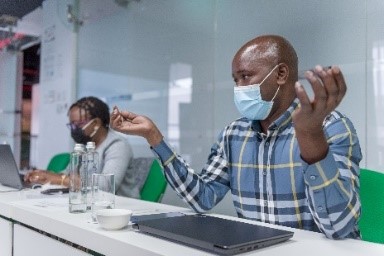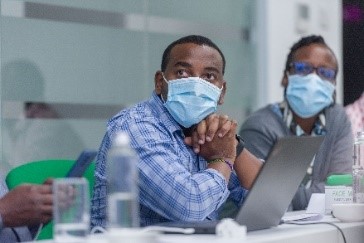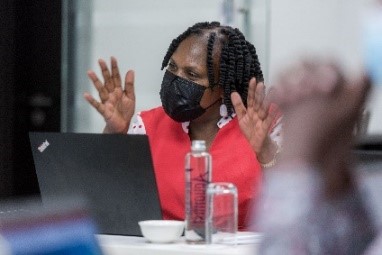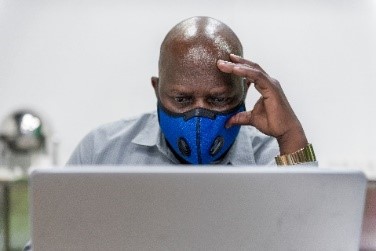Fleming Fund Fellowship Tanzania Graduates Five Fellows!
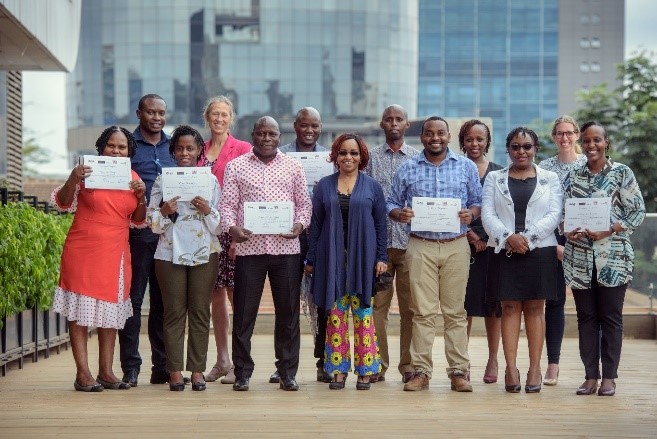
ASLM is leading an alliance of six partners serving as a host institution for the Fleming Fund Fellowship in Tanzania. The Fleming Fund Fellowship, supported by UK Aid, aims to mentor leaders of national antimicrobial resistance (AMR) surveillance programmes of low- and middle-income countries, to improve laboratory diagnostic capacity and surveillance AMR and antimicrobial use/consumption AMU/C. The partners of the ASLM-led Fellowship Alliance include AFENET, the Infectious Diseases Institute (IDI), DATOS, AIGHD and the Noguchi Memorial Institute for Medical Research at the University of Ghana. On 6 April 2022, the Fleming Fund hosted a virtual closing ceremony to celebrate the hard work and accomplishments of the Cohort 1 fellows. Nick Adkin of the UK Department of Health and Social Care addressed the audience, and the graduates were presented with certificates and then welcomed to the Alumni Network
Tanzania Cohort 1 Fellowship
The Tanzania Cohort 1 fellowship scheme was launched in September 2019 and supported five professionals from both the human and animal health sectors in Tanzania who were playing a leadership role in implementing the AMR and AMU/C surveillance component of the country’s national AMR action plan. The fellows were primarily nominated from within public government institutions to directly build national capacity to respond to AMR. Each fellow was assigned an experienced mentor from the ASLM Fellowship Alliance, who provided technical and scientific input to the fellow’s work plan, with clear education and implementation deliverables. The scheme provided opportunities for the fellows to build expertise in AMR and AMU/C surveillance through a coordinated One Health approach and to train for leadership roles in One Health-based AMR surveillance in the country.
| Name | Fellowship | Beneficiary Institution |
|
|
AMR Surveillance, Human Health |
Ministry of Health Tanzania Preventive Services Epidemiology and Disease Control |
|
|
AMR Surveillance, Animal Health |
Tanzania Veterinary Laboratory Agency Central Veterinary Laboratory |
|
|
AMR Laboratory, Human Health |
Ministry of Health Tanzania Curative Services Diagnostics National Public Health Laboratory |
|
|
AMU/C Surveillance, Human Health |
Ministry of Health Tanzania Pharmaceutical Services |
|
|
AMU/C Surveillance, Animal Health |
Ministry of Livestock and Fisheries Directorate of Veterinary Services |
Fellowship Summary
Despite interruptions from the COVID-19 pandemic, the fellowship has been a tremendous journey and successful learning experience about AMR and AMU/C under the One Health approach. The fellowship included trainings, mentorship, networking, and design and implementation of a collaborative project titled ‘A One Health pilot study on antimicrobial resistance and use of fluoroquinolones and cephalosporins in the human and animal health sectors in Mwanza, Tanzania’. A total of 550 isolates underwent antibiotic susceptibility testing (400 isolates from humans and 150 isolates from healthy chicken samples). Findings from this study strongly suggest that the observed resistance to cephalosporins (ceftriaxone) in isolates from human samples could be attributed to emerging resistance to third- and fourth-generation cephalosporins observed in poultry production in Mwanza, as well as the observed high consumption/use of this class of antibiotics in the Bugando Medical Centre area, in both the human and animal health sectors. Data from this study provides robust scientific evidence about AMR patterns in bacterial infections among humans and animals and can be used to inform global health action in Tanzania.
Two abstracts from this study by Dr Emmanuel Mayenga and Ms Siana Mapunjo titled ‘Resistance of Escherichia coli and Klebsiella pnuemoniae to fluoroquinolones and cephalosporins in healthy chickens in Mwanza, Tanzania’ and ‘Consumption and use of fluoroquinolones, 3rd and 4th Generation Cephalosporins in Mwanza Tanzania’ have been accepted for poster presentations at the Global Health Security 2022 Conference taking place in Singapore from 28 June to 1 July 2022. These two fellows will be supported by the scheme to attend the conference and present their work.
Fellows were trained on AMR data analysis, WHONET, defined daily dose methodology, applied statistics and writing policy briefs. Notably, the fellows travelled to Nairobi, Kenya for the AMR communication workshop conducted in collaboration with ReACT Africa. Fellows also enjoyed various placements at host institutions and other key stakeholders including at IDI in Uganda, Noguchi Memorial Institute for Medical Research in Ghana, and the National Institute for Communicable Diseases in South Africa, to mention a few. Being a blend of both online and face-to-face learning, the scheme allowed mentors, including those from IDI, DATOS and AIGHD to travel to the country. Their physical presence was a key to the success of these Cohort 1 fellows, as it assured flexibility and adaptation of workplans based on the fellow’s workplace environment.
Beyond the Fellowship
To ensure that the knowledge and expertise gained throughout the fellowship is sustained, the fellows will continue supporting efforts to combat AMR in Tanzania through mentorship of colleagues at the beneficiary institutions and through supporting the AMR multi-sectorial coordinating committee (MCC) in implementing the AMR national action plans in various capacities. Ms Siana Mapunjo and Dr Gibonce Kayuni are part of the AMR MCC secretariat, Dr Emmanuel Mayenga is a member of the Animal Health Sub technical working group (TWG), Emmanuel Magembe is a member of the of the AMR Surveillance TWG, and Neema Camara is the International Health Regulations Coordinator. Lastly, the fellows will support the genomic sequencing of the AMR isolates from the collaborative project as a mechanism to strengthen AMR surveillance in Tanzania, as well as link with the Cohort 2 AMR Policy fellows in efforts to disseminate findings of the collaborative project at high-level meetings critical for decision making.
Be sure to watch ASLM’s videos about how the Fleming Fund Fellowship grant is helping ASLM and partners fight AMR in Africa.
Author: Dr Pascale Ondoa, Junior Shao and Edwin Shumba
Editor: Mrs Bethanie Rammer
About ASLM
Established in 2011, the African Society for Laboratory Medicine (ASLM) is a pan-African professional body focused on improving healthcare by strengthening all aspects of laboratories including workforce strengthening, quality improvement and accreditation, regulation(s) harmonization, networks strengthening, and advocacy and communication strengthening. Laboratory testing is pivotal for disease diagnosis, epidemiological surveillance, outbreak investigation, and treatment initiation and monitoring, as well as research and development. ASLM addresses these challenges by working collaboratively with governments; national, regional and international organizations; implementing partners; the private sector; and other agencies to achieve its strategic vision goals. ASLM is endorsed by the African Union with support from the World Health Organization, Africa CDC, the US CDC, the US President’s Emergency Plan for AIDS Relief, the World Bank, the Clinton Foundation, UNAIDS, and others.


